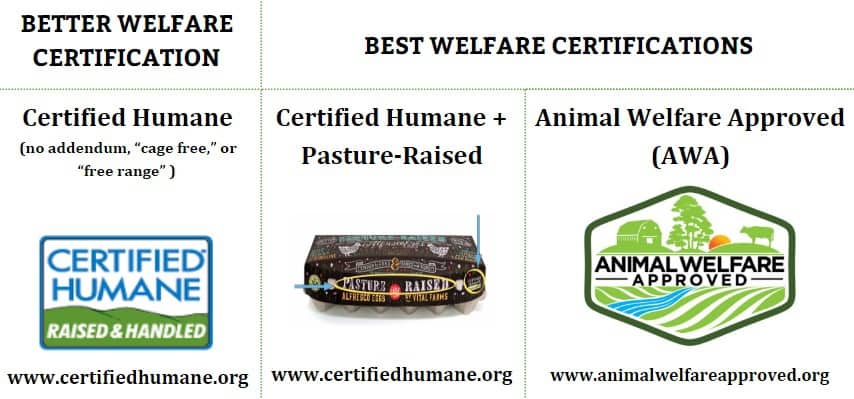The United States is reaching a tipping point on eggs. With one small change–committing to buying only higher welfare eggs–you can make a real difference in improving the lives of millions of hens. We’re close to winning, but we need you!
Why are higher welfare eggs important?
Egg-laying hens endure some of the worst abuses in factory farming — packed five or more to a tiny wire cage, they cannot move around freely or spread their wings.
A hen spends her entire life in a meager amount of space, smaller than a piece sheet of printer paper or an iPad. She cannot engage in any of her natural behaviors like nesting, perching, and dustbathing, let alone stretching and walking. In cages, these hens suffer from injuries, disease, and extreme mental and emotional distress.
More than 90% of laying hens in the U.S. are packed into tiny cages on factory farms. To support systems where hens can walk, spread their wings, lay eggs in nesting spaces, dust bathe, and perform other natural behaviors, we must support farms that value higher welfare. There’s more we can do for hens, but buying higher welfare eggs is where we start!
Is this a Jewish Issue?
We are mandated by Jewish tradition to have compassion for all creatures, especially those who rely exclusively on humans for proper mental and physical care. Committing to the sourcing of better welfare eggs is a small, yet significant step towards fulfilling this mandate and treading more humanely on our earth.
For guidance, we look to the mitzvah of tzaar baalei chayim, a rabbinic mandate and moral imperative that forbids causing animals unnecessary suffering. Perpetuating the mistreatment of farmed animals like these laying hens surely violates the value of compassion expressed in myriad stories and teachings throughout Jewish text and tradition.
Why now?
As people have started learning more about where most eggs come from, many have been disturbed by the status quo and are demanding better. Five states have passed legislation forbidding cruel battery cages on farms. Several states have passed legislation forbidding cruel battery cages, and more states are sure to follow. The industry is on the verge of change, and consumer pressure right now can tip the scales.
Change starts with you and your institution. You can serve as a role model to the Jewish community, showing that it’s possible to commit to buying higher welfare eggs and live out our Jewish values of treating animals with compassion.
How can we switch to higher welfare eggs?
- Choose products with labels “Certified Humane,” “Certified Humane + Pasture Raised,” or “Animal Welfare Approved.” These are some of the only labels on egg cartons that are truly meaningful for animal welfare.
- Use BuyingPoultry.com, a poultry welfare rating tool, to search a list of higher-welfare egg brands and retailers.
- Download the Hazon Food Guide for more information about higher-welfare products.
- Contact Jewish Initiative for Animals for support in finding higher-welfare eggs.

The Egg on the Seder Plate
Download the Higher Welfare Egg Haggadah Supplement to start the conversation about animal welfare over Passover. Why is there an egg on the Seder plate, and how can you make sure your seder plate promotes animal welfare?
We encourage every Jewish institution and household to commit to buying higher-welfare eggs this year.
For support and consultation on higher welfare eggs or egg-free alternatives, contact Jewish Initiative for Animals or FoodEducation@hazon.org.




